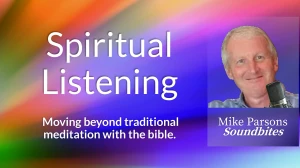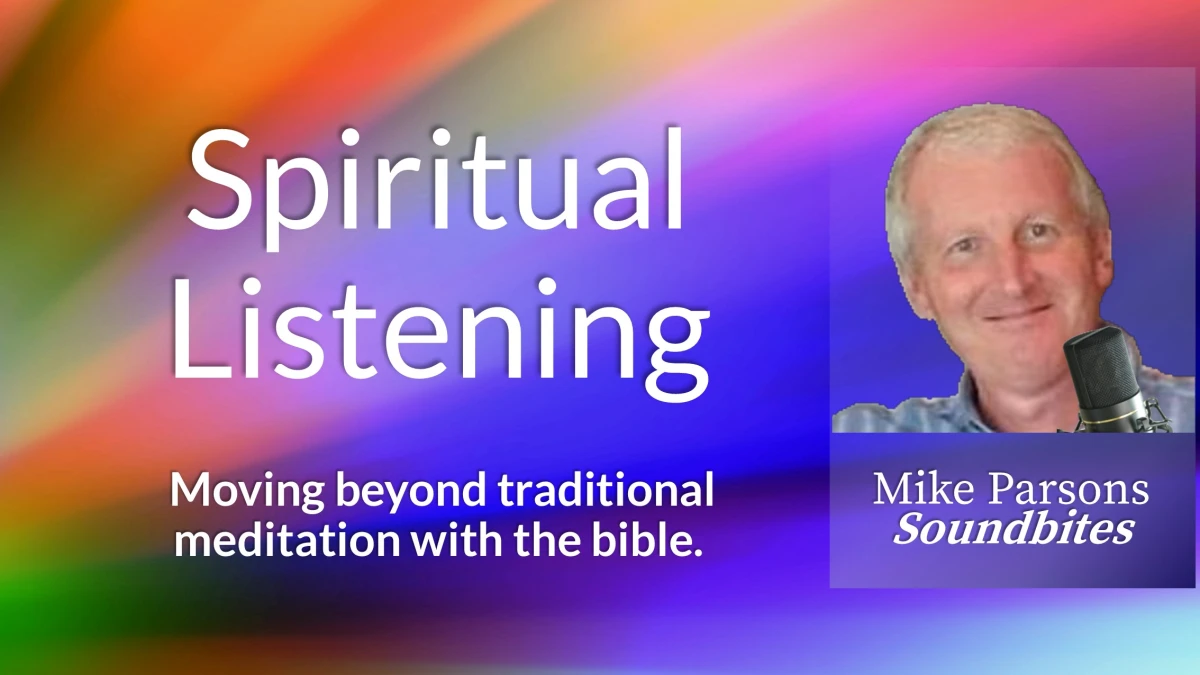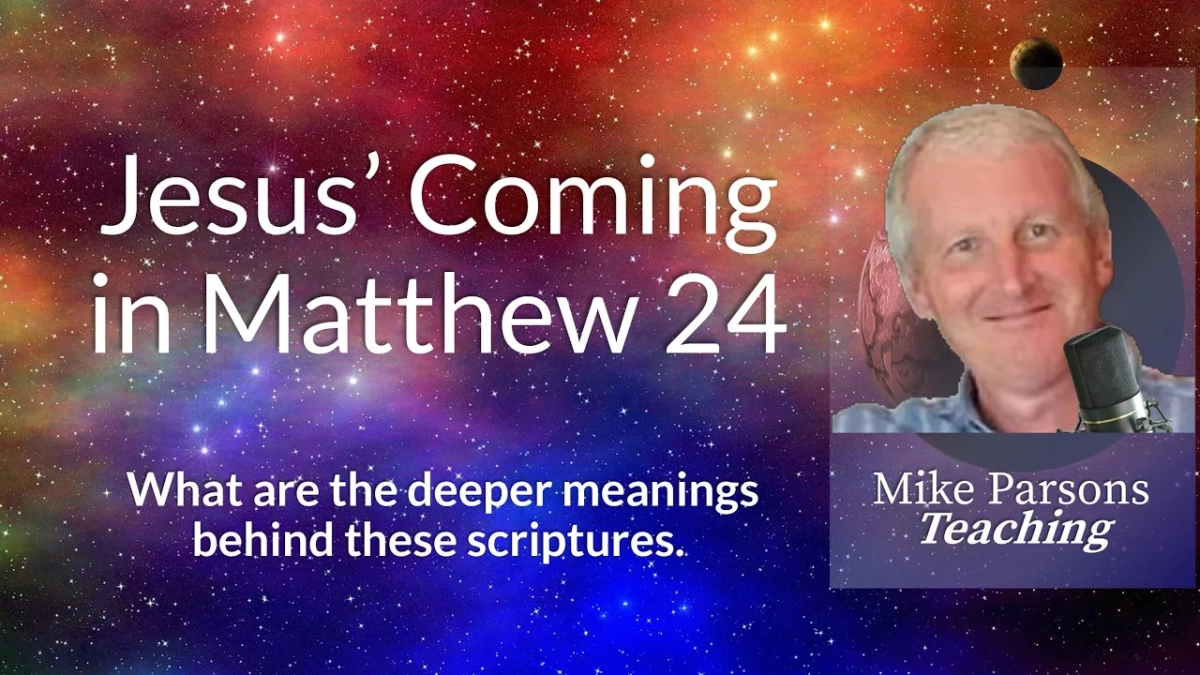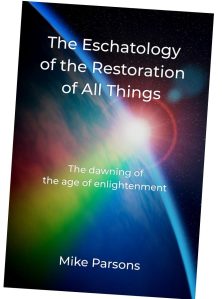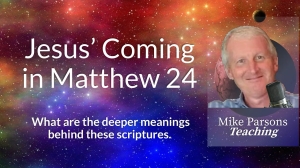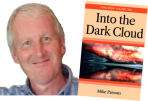Mike Parsons
with Jeremy Westcott –
God spoke
“…the period of restoration of all things about which God spoke by the mouth of His holy prophets from ancient time” (Acts 3:21).
In his sermon on the day of Pentecost, Peter tells his audience that God has already spoken about the restoration of all things in the past. So who were those prophets He spoke through, what did He say and when did He say it? And if these things were spoken, were they also written down, and if so, where?
- In the 39 books which we call the Old Testament? Or the 24 books of the Hebrew Tanakh? Or the Talmud or Rabbinical writings?
- Is it only the Bible that records what God spoke by His holy prophets? Are there other written records of what the prophets said?
- What about the Apocryphal books which were once included in our Bible? What about other Jewish mystical writings such as the Talmud, Targum, Midrash and Zohar?
Those are the kinds of questions which go through my mind when I read something like that.
In His Son
God, after He spoke long ago to the fathers in the prophets in many portions and in many ways, in these last days has spoken to us in His Son… (Heb 1:1-2).
That is where we are. We actually do not need a prophet to speak to us anymore, because we have Jesus to speak to us. The Father can speak to us. The Holy Spirit can speak to us. And they can speak to us directly, they do not need a prophet to be a mediator.
When He spoke to prophets who lived 3000 years or so ago, He spoke to them in the context of their own society and way of life. If we simply read what they wrote, it might not mean the same to us (especially if we don’t speak their language). We need God the Holy Spirit to speak to us so that, whether we have it in writing or not, He can say it in a way appropriate for us and apply it to our situation today.
If we will learn to hear God’s voice and discern what He is saying, we may find He has much more to say than we ever thought. He speaks to me in all kinds of ways, not just through scripture. If He speaks to me through a sci-fi film, is that less valid than Him speaking to me through the Bible?
Truth and opinion
I often find I have more questions than answers! That is because I now recognise that many things I thought I knew were only assumptions, or other people’s opinions. My understanding was framed by what I was taught about how God spoke and what the Bible meant. But in the process of God renewing my mind, He began to challenge me on some of these things.
Jesus is the Truth. So wherever there is truth, it must be from Jesus. Whether it is in a movie, or a book, or music, or some other creative work, it must be Jesus. The conclusions people draw, or the way they interpret that truth, that is not necessarily Jesus. We cannot assume that just because one part within it rings true, that everything in it is true. The Holy Spirit will give us that discernment. We can find truth in many things, truth that we might miss if we believe the only way we can receive truth is through the Bible.
The Bible
So where does the Bible (and other ‘scripture’) fit into the picture of what will be restored? Where does the Bible fit into our lives? Is it a manual for living or an introduction to a living, loving relationship with Jesus, the Living Word? Is everything that is recorded in the Bible inspired by God? What do we mean by ‘inspired’? Is all of the Bible inerrant and infallible as we may have been told?
I understand that posing such questions risks causing offence. I am not setting out to deliberately offend but I do want to challenge our view of the Bible as the ‘word of God’. Everything God has ever said, through anyone or anything, is the word of God. But it is not a book. Nowhere in the Bible does it call itself ‘the word of God’ but it does call Jesus Himself the Word:
In the beginning was the Word [Gk: logos], and the Word was with God, and the Word was God (John 1:1).
Perhaps we have been taught that the Greek word logos means the written word, the Bible, and the Greek word rhema means the spoken words of Jesus, recorded in the Bible, or the words the Holy Spirit speaks to you when you read the Bible. Logos and rhema do not mean that. They were the normal, everyday terms for written word and spoken word and that is all.
The early believers did not even have a Bible when those words were used. The books contained in our Bible were not originally part of a collection of writings at all. They were letters, or books of history, prophecy, or poetry and so on. And some of the books that were included in the first ‘canon of scripture’ have since been discarded.
Evangelicalism
No one lives without influence. Everyone’s mind is framed by their belief systems. In the process of the deconstruction and renewal of my mind, God showed me that one of the pillars of so-called ‘truth’ that framed my beliefs was evangelicalism.
This is a belief system which teaches that the Bible does not merely contain the word of God, but that every word of it is the word of God. Scripture therefore carries the full authority of God: every single statement of the Bible calls for instant, unqualified and unrestricted acceptance. In fact many evangelical churches hold to the doctrine of Sola scriptura (Latin: by scripture alone): the Christian scriptures are the sole infallible rule of faith and practice.
Ironically, you will not find any of that in the Bible. It is not there because it is a man-made doctrine. Not only does the Bible never call itself ‘the word of God’, it does not claim to be inerrant, infallible or the only authoritative guide for us either. The emphasis on following the Bible only arose because no one taught us that we really could have an intimate face-to-face relationship with Jesus in which He could speak to us personally. Jesus is the One we are supposed to listen to and follow, not a book.
In reality, not everything in the Bible applies to us.
Much of the Old Testament and law only applied to Jewish people and converts, or to the specific people being addressed, not to us in the new covenant. Much of the New Testament was written to address the events of the destruction of Jerusalem in AD 70, the end of the old covenant system. Paul wrote letters to certain churches in circumstances we do not face today. Some passages only make sense in their own cultural context – though I was brought up in a church which had a stock of head coverings at the door for women thoughtless enough to come without one (1 Cor: 11:5-8).
The Living Word
Jesus never promised a book, but a relationship with Himself, with His Father and with the Holy Spirit of Truth. Everything we read in the Bible needs to be interpreted by the Holy Spirit dwelling within us. There is some universal truth within it which is awesome, revealing the loving nature and character of the Father. The Holy Spirit will show us that universal truth and how it is to be applied to our lives.
The Living Word, Jesus, can interpret whatever has been written, speak directly to us daily and bring truth to us even if it is completely out of the context it was originally written in. He did that when He came – and we can read about it in the Bible! How many times in the Sermon on the Mount did He say “You have heard it said… but I say…”? He still does it today.
Recent posts by FreedomARC
For interest: The Chicago Statement on Biblical Inerrancy (1978):
“Those who profess faith in Jesus Christ as Lord and Savior are called to show the reality of their discipleship by humbly and faithfully obeying God’s written Word.”
Articles by others
Support Freedom ARC


Our Patreon patrons give a small amount each month and can join us for our monthly group Zooms, get exclusive or early access to Mike’s teaching and enjoy further patron-only benefits. Or you can use the blue button to contact us about making a one-time gift.
Thank you!
*Note Sadly, because of abuse by scammers we can no longer offer a ‘click to donate’ option. However, if you contact us, we will get back to you with a simple means of giving.

Header image by Gerd Altmann from Pixabay
